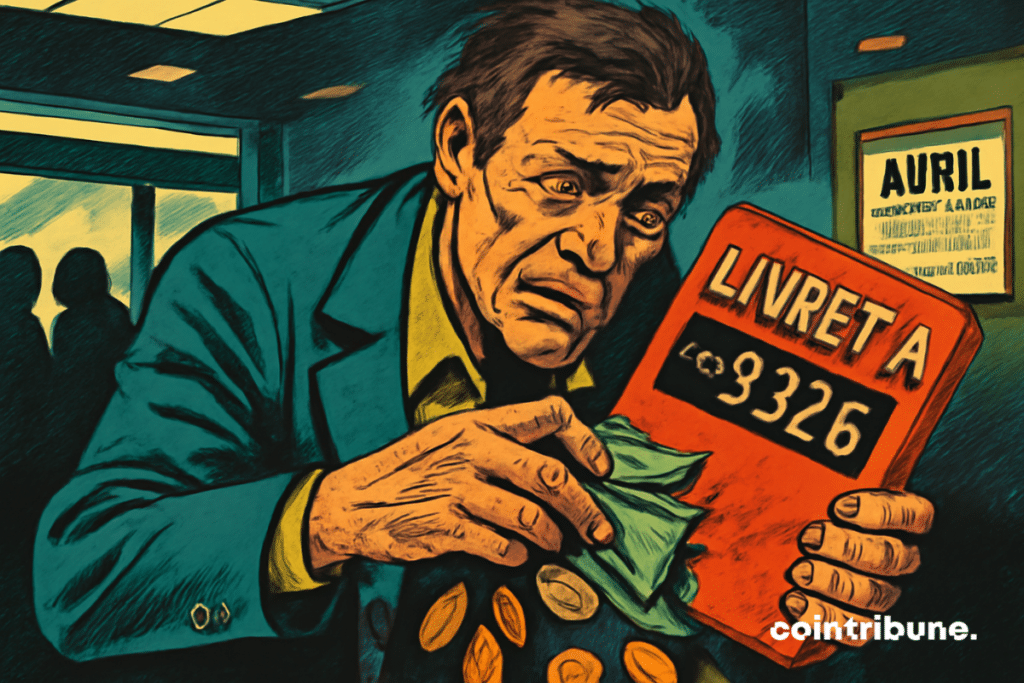Finance: The French Are Shunning The Livret A, 200 Million Euros Gone.
April 2025 will be remembered as a particularly dark month for the Livret A. This favorite savings tool of the French shows an unprecedented negative balance since 2009, with withdrawals exceeding deposits by 200 million euros. The recent drop in its interest rate seems to have caused widespread disillusionment among savers.

In brief
- The Livret A recorded in April 2025 a historic withdrawal of 200 million euros, its worst result since 2009, following the decrease of its rate to 2.4%.
- While the LDDS resists with positive inflows, the LEP collapses with a record withdrawal of 1.96 billion euros, revealing the growing fragility of low-income households.
- Facing the loss of confidence, savers are turning to alternatives such as life insurance or even bitcoin.
Rates in free fall: the disillusionment of the French
It was last February that the Livret A suffered a notable drop in its rate, falling from 3% to 2.4%. This reduction, announced in January, led to a net outflow of 200 million euros in April, revealing fatigue towards this traditional investment. A symbol of prudent finance but increasingly unattractive, it now pushes some savers towards better remunerated alternatives, such as those presented in the ultimate guide to Super Savings Accounts.
By comparison, April 2015 had also seen the Livret A end in the red, but with an outflow half as large, at only 100 million euros. Thus, the extent of the disengagement in 2025 is worrying, highlighting a potentially lasting crisis of confidence in this once essential savings product.
The French now seem to be turning away from this classic form of savings to explore other more dynamic financial options, such as life insurance, which attracted record sums last March. This phenomenon clearly illustrates an evolution in the financial behaviors of savers.
The LDDS resists, the LEP collapses
In this gloomy climate, the Livret de développement durable et solidaire (LDDS) nevertheless manages to hold its own, with positive inflows of 310 million euros in April, as reported by Le Figaro. Although similar to the Livret A, the LDDS manages to better resist, probably thanks to its image associated with responsible and sustainable investments.
Conversely, the Livret d’épargne populaire (LEP) has followed an even more dramatic path. Reserved for low-income households, it showed a record deficit of 1.96 billion euros. Although April is traditionally a difficult month for this product due to annual closures for non-compliance with conditions, the severity of this outflow raises questions about the growing precariousness of modest households.
By comparison, the outflow in April 2024 was much smaller, at only 270 million euros. This contrast highlights not only a cyclical disinterest but also a structural weakening of popular savings in France.
Outlook: temporary crisis or lasting trend?
Despite these setbacks, the total amount accumulated by these accounts remains near historic highs: 444 billion for the Livret A and 162.7 billion for the LDDS. However, the current trend could intensify if rates continue to decrease or if more attractive alternatives emerge sustainably.
Faced with these behavior changes, financial actors will need to quickly propose solutions to restore savers’ confidence. The challenge will be to offer competitive yields while reassuring on the security and accessibility of these investments. In a context where some now turn to alternative assets like bitcoin, perceived by part of the public as a more attractive store of value, April 2025 could thus be either a mere accident or the beginning of a deep mutation in French savings.
Maximize your Cointribune experience with our "Read to Earn" program! For every article you read, earn points and access exclusive rewards. Sign up now and start earning benefits.

Fascinated by Bitcoin since 2017, Evariste has continuously researched the subject. While his initial interest was in trading, he now actively seeks to understand all advances centered on cryptocurrencies. As an editor, he strives to consistently deliver high-quality work that reflects the state of the sector as a whole.
The views, thoughts, and opinions expressed in this article belong solely to the author, and should not be taken as investment advice. Do your own research before taking any investment decisions.